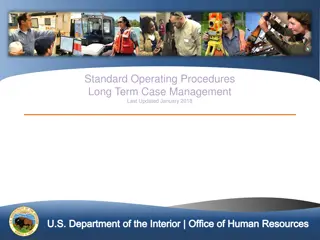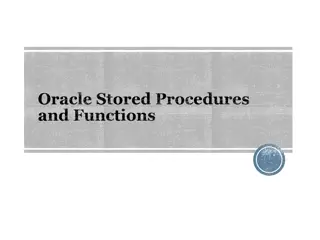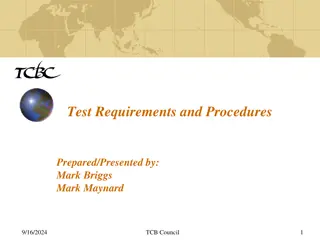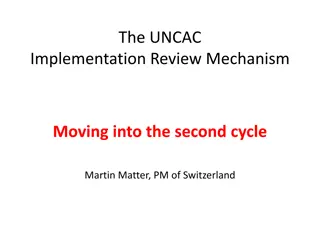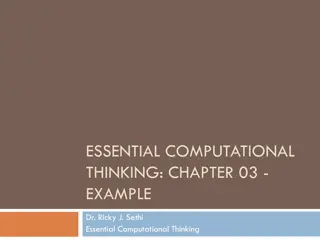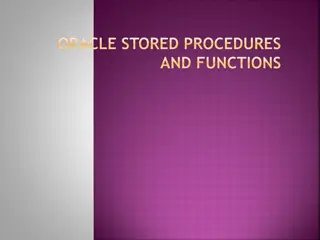INLS 623 Stored Procedures Review and Advantages
In this information-rich content, explore topics covered in INLS 623 such as stored procedures, triggers, indexing, normalization, and advanced SQL. Discover the intricacies of database and internet applications, three-tiered architectures, and the advantages and disadvantages of three-tier architecture. Dive into technologies utilized, including HTML, JavaScript, PHP, cookies, Apache, MySQL, XML, and stored procedures/functions. Uncover the benefits of a three-tier architecture and the potential challenges it presents.
Download Presentation

Please find below an Image/Link to download the presentation.
The content on the website is provided AS IS for your information and personal use only. It may not be sold, licensed, or shared on other websites without obtaining consent from the author.If you encounter any issues during the download, it is possible that the publisher has removed the file from their server.
You are allowed to download the files provided on this website for personal or commercial use, subject to the condition that they are used lawfully. All files are the property of their respective owners.
The content on the website is provided AS IS for your information and personal use only. It may not be sold, licensed, or shared on other websites without obtaining consent from the author.
E N D
Presentation Transcript
INLS 623 STORED PROCEDURES Instructor: Jason Carter
MIDTERM March 9 Review March 2 Topics Covered: Normalization Advanced SQL Database and Internet Applications Stored Procedures/Triggers Indexing
DATABASE AND INTERNET APPLICATIONS Client Server HTTPRequest Response GET POSTRedirect HTML Java JavaScript AJAX PHP SQL ASP.NET CSS Python Cookies
THREE TIERED ARCHITECTURES Presentation tier Client Program (Web Browser) Middle tier Application Server Data management tier Database System
THE THREE LAYERS Presentation tier Primary interface to the user Needs to adapt different displays (PC, cell, tablet, etc) Middle tier Implements business logic (implements complex actions, maintains state between different steps of workflow) Access different data management systems Data management tier One or more standard database management system
TECHNOLOGIES HTML Javascript Client Program (Web Browser) PHP Cookies Application Server (Apache) Database System (MySQL) XML Stored Procedures Functions
ADVANTAGESOFTHE THREE-TIER ARCHITECTURE Heterogeneous Tiers can be independently maintained, modified, and replaced Scalability Data Management Tier can be scaled by database clustering without involving other tiers Middle Tier can be scaled by using load balancing Fault Tolerance Data Management Tier can be replicated without involving other tiers Software development Code is centralized Interaction between tiers through well-defined APIs: Can reuse standard components at each tier
DISADVANTAGESOF 3-TIER ARCHITECTURE It is more complex It is more difficult to build a 3-tier application The physical separation of the tiers may affect the performance of all three If hardware and network bandwidth are not good enough because more networks, computers, and processes are involved
TECHNOLOGIES HTML Javascript Client Program (Web Browser) PHP Cookies Application Server (Apache) Database System (MySQL) XML Stored Procedures Functions
STORED PROCEDURES Database program modules that are stored and executed by the DBMS at the server DELIMITER // CREATE PROCEDURE GetAllProducts() BEGIN SELECT * FROM products; END // DELIMITER ;
WHY STORED PROCEDURES Reduces Duplication of effort and improves software modularity Multiple applications can use the stored procedure vs. the SQL statements being stored in the application language (PHP) Reduces communication and data transfer cost between client and server (in certain situations) Instead of sending multiple lengthy SQL statements, the application only has to send the name and parameters of the Stored Procedure Can be more secure than SQL statements Permission can be granted to certain stored procedures without granting access to database tables
DISADVANTAGESOF STORED PROCEDURES Difficult to debug MySQL does not provide ways for debugging stored procedures Many stored procedures can increase memory use The more stored procedures you use, the more memory is used Can be difficult to maintain and develop stored procedures Another programming language to learn
CREATING STORED PROCEDURES DELIMITER // CREATE PROCEDURE NAME BEGIN SQL STATEMENT END // DELIMITER ; DELIMITER // CREATE PROCEDURE GetAllProducts() BEGIN SELECT * FROM products; END // DELIMITER ;
CALLING STORED PROCEDURES CALL STORED_PROCEDURE_NAME CALL GetAllProducts();
VARIABLES A variable is a name that refers to a value A name that represents a value stored in the computer memory PHP $name = Jason $age = 5; MySQL DECLARE name VARCHAR(255) DECLARE age INT
PARAMETERS There may be times where you want to pass information to the stored procedures Getting user input from a form and using that input in a SQL statement
THREE TYPESOF PARAMETERS IN Default OUT INOUT
IN PARAMETER Calling program has to pass an argument to the stored procedure.
ARGUMENTSAND PARAMETERS Defining DELIMITER // CREATE PROCEDURE GetOfficeByCountry(IN countryName VARCHAR(255)) BEGIN SELECT * FROM offices WHERE country = countryName; END // DELIMITER ; Calling CALL GetOfficeByCountry('USA') The values being copied from the calling stored procedure are calling arguments. The variables being copied into are called parameters.
THREE TYPESOF PARAMETERS IN Default OUT INOUT
OUT PARAMETER OUT the value of an OUT parameter can be changed inside the stored procedure and its new value is passed back to the calling program OUT is a keyword
OUT PARAMETER Defining DELIMITER // CREATE PROCEDURE CountOrderByStatus(IN orderStatus VARCHAR(25), OUT total INT) BEGIN SELECT count(orderNumber) INTO total FROM orders WHERE status = orderStatus; END// DELIMITER ; Calling CALL CountOrderByStatus('Shipped',@total); SELECT @total; The out parameter is used outside of the stored procedure.
THREE TYPESOF PARAMETERS IN Default OUT INOUT
CONDITIONALS $sql = "select * from products WHERE quantityInStock < '".$quantityInStock ." ; $sql = "select * from products WHERE quantityInStock > '".$quantityInStock ." ; Could we have one call to the database instead of two?
THEIF STATEMENT Mysql Syntax IF if_expression THEN commands [ELSEIF elseif_expression THEN commands] [ELSE commands] END IF; First line is known as the IF clause Includes the keyword IF followed by condition followed by the keyword THEN When the IFstatement executes, the condition is tested, and if it is true the block statements are executed. Otherwise, block statements are skipped
IFEXPRESSION: BOOLEAN EXPRESSIONSAND OPERATORS
IF STATEMENT DELIMITER // CREATE PROCEDURE GetProductsInStockBasedOnQuantitityLevel(IN p_operator VARCHAR(255), IN p_quantityInStock INT) BEGIN IF p_operator = "<" THEN select * from products WHERE quantityInStock < p_quantityInStock; ELSEIF p_operator = ">" THEN select * from products WHERE quantityInStock > p_quantityInStock; END IF; END // DELIMITER ;
IF STATEMENT CREATE PROCEDURE GetProductsInStockBasedOnQuantitityLevel (IN p_operator VARCHAR(255), IN p_quantityInStock INT) The ooperator > or < The number in stock
THE IF STATEMENT IF p_operator = "<" THEN select * from products WHERE quantityInStock < p_quantityInStock; ELSEIF p_operator = ">" THEN select * from products WHERE quantityInStock > p_quantityInStock; END IF;
LOOPS While Repeat Loop Repeats a set of commands until some condition is met Iteration: one execution of the body of a loop If a condition is never met, we will have an infinite loop
WHILE LOOP WHILE expression DO Statements END WHILE The expression must evaluate to true or false while loop is known as a pretest loop Tests condition before performing an iteration Will never execute if condition is false to start with Requires performing some steps prior to the loop
INFINITE LOOPS Loops must contain within themselves a way to terminate Something inside a while loop must eventually make the condition false Infinite loop: loop that does not have a way of stopping Repeats until program is interrupted Occurs when programmer forgets to include stopping code in the loop
WHILE LOOP DELIMITER // CREATE PROCEDURE WhileLoopProc() BEGIN DECLARE x INT; DECLARE str VARCHAR(255); SET x = 1; SET str = ''; WHILE x <= 5 DO SET str = CONCAT(str,x,','); SET x = x + 1; END WHILE; SELECT str; END// DELIMITER ;
WHILE LOOP Creating Variables DECLARE x INT; DECLARE str VARCHAR(255); SET x = 1; SET str = '';
WHILE LOOP WHILE x <= 5 DO SET str = CONCAT(str,x,','); SET x = x + 1; END WHILE;
PRACTICE Look at homework
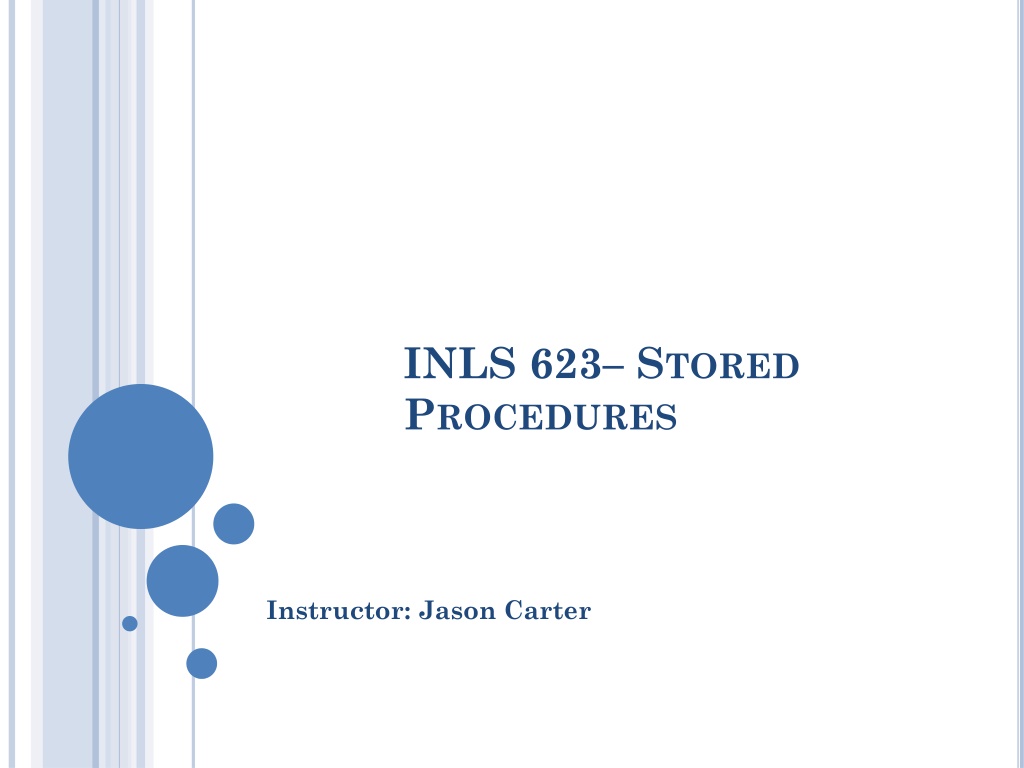
 undefined
undefined































